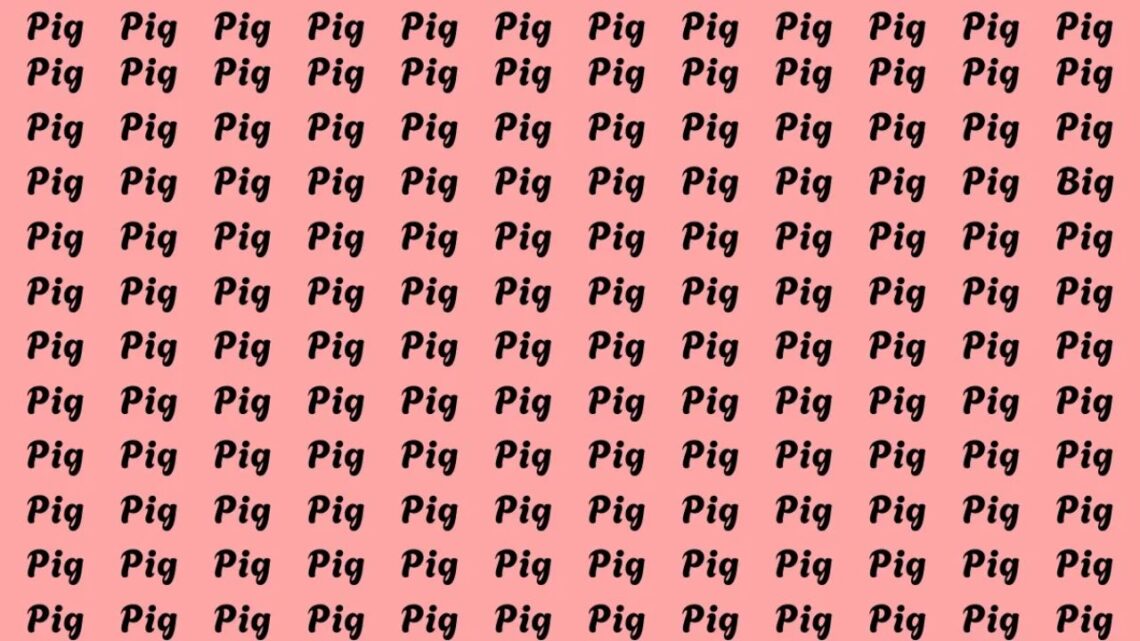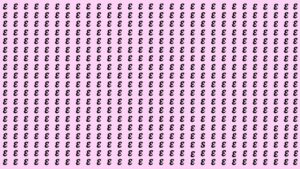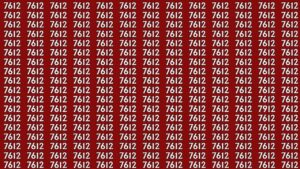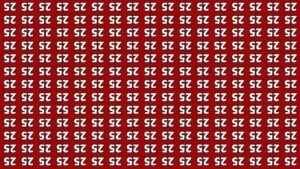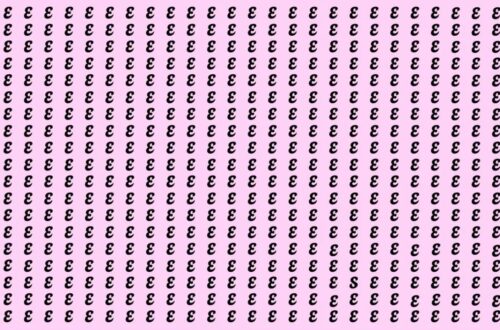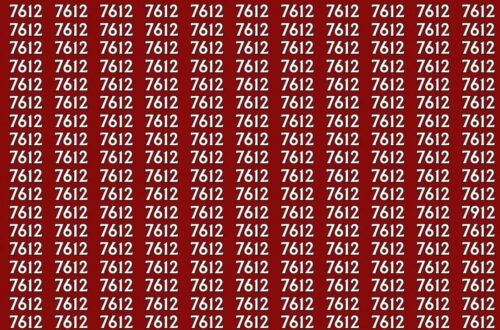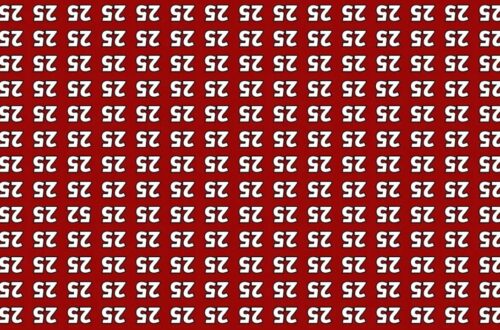The Optical Illusion Eye Test challenges you to find the word “Big” among many “Pig” entries inside a dense word grid.
In current viral versions circulating in October 2025, players aim to beat a 7-second timer.
It’s a short, high-pressure visual search that hinges on a tiny letter swap—B versus P—which makes the target blend into the crowd.
Why This Puzzle Feels So Hard
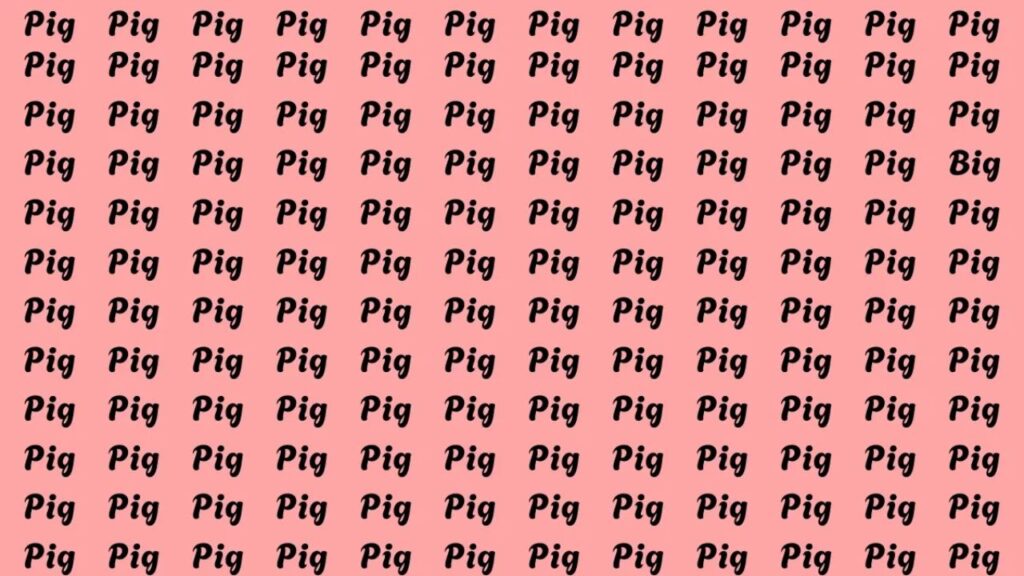
Your brain leans on pattern recognition and prediction. After seeing “Pig” repeatedly, your mind starts to autofill what it expects, making it easier to skip the B in “Big.”
This effect is amplified by crowding (distractors packed around a target) and attentional blink (brief blind spots when you scan quickly).
Add a ticking clock and you’ve got the perfect recipe for a viral challenge that tests focus, speed, and accuracy.
Latest Trend Snapshot
Word-swap illusions—like finding “FROM” hidden among “FORM,” or spotting a single number out of look-alikes—are trending this season, and “Big among Pig” is the most shareable of the lot.
Creators keep the game fresh by shuffling the grid and moving the solution to different corners. That means you can’t memorize a single location; you need a repeatable method.
How To Beat The Timer
- Hunt The B First: Train your eyes to detect the double bowl shape of “B.” Unlike “P,” it has two rounded sections.
- Scan In Lanes: Sweep row by row or column by column to avoid backtracking.
- Zoom Discipline: Pick one zoom level and stick to it; constant resizing costs time.
- Corner Check: Do a quick pass along the edges and corners—a common place for hidden targets.
- Blink Reset: A brief blink reduces micro-fixation and helps “refresh” contrast when letters start to blur.
Challenge Details
| Item | Details |
|---|---|
| Task | Find the word “Big” among many “Pig” entries |
| Suggested Time To Beat | 7 seconds for casual players; 5–6 seconds for advanced |
| Primary Skills Tested | Visual attention, pattern detection, speed |
| Common Mistake | Brain autocompletes “Pig,” skipping the B in “Big.” |
| Best Starting Strategy | Scan only for “B” shapes; ignore the rest |
| Typical Trap Areas | Edges, corners, mid-cluster gaps |
| Practice Progression | Start at 10 seconds, then aim for 7, then 5–6 |
| Ideal Screen Setup | Consistent zoom, good contrast, minimal glare |
Pro Tips For Faster Scores
- Set Micro-Goals: Run five attempts in a row and record your best time—this builds confidence and consistency.
- Alternate Grids: Mix word and number illusions (e.g., odd “796” among “769”) to generalize your search template.
- Shape Over Spelling: Treat each letter as a shape, not a word. Your eyes move faster when they’re matching forms rather than reading.
- Peripheral Sweep: After your central pass, glide your gaze along the outer frame of the grid to catch any sneaky placements.
Solution: Where “Big” Is Hidden
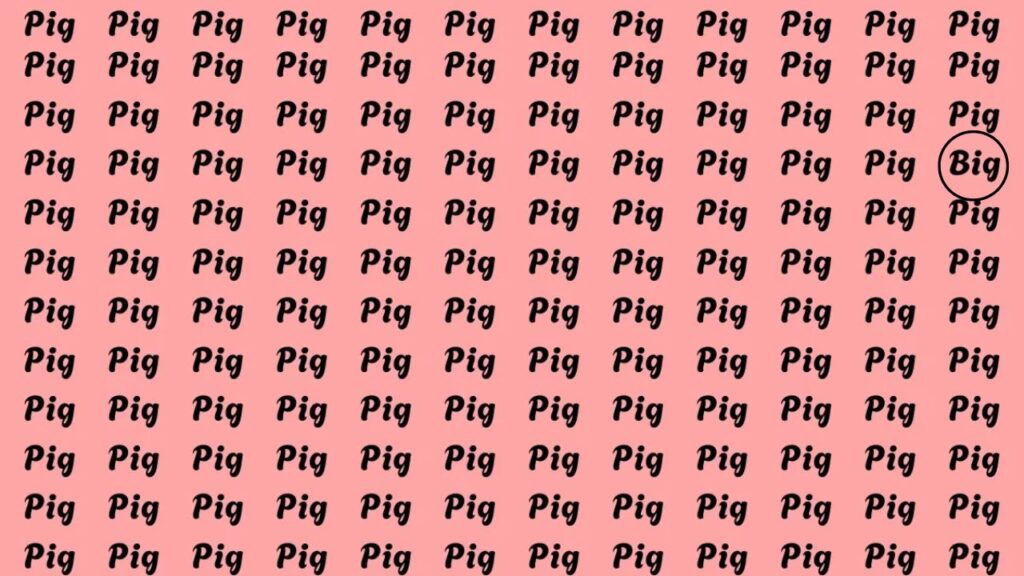
The hidden word “Big” sits in the upper-right area of the grid—approximately the 5th row from the top and the 2nd column from the right. You can confirm it by scanning for the distinctive “B” (two bowls) instead of the “P.”
In your image, the correct “Big” is already circled, marking the exact location.
Why It’s Perfect For Social Feeds
The test is snackable, measurable, and replayable. A single screenshot can host the entire game, and a bold timer pushes friendly competition.
Because the solution can sit anywhere in the grid, every repost feels new, which fuels shares and comments like “I got it in 5 seconds!” or “Missed it twice!”
The Optical Illusion Eye Test—find “Big” among “Pig”—is the season’s standout attention and speed challenge.
Its power comes from a simple letter swap that exploits our bias for repetition, plus a short timer that keeps adrenaline high.
Use a B-first scan, move in clean lanes, and add a quick peripheral sweep. With a bit of practice, you’ll slash your time from 10 seconds to 7, and soon flirt with the 5–6 second elite tier.
FAQs
What’s a good time for beginners?
Start with 10 seconds. Once you can consistently spot “Big” under that, push down to 7 seconds.
Is the answer always in the same place?
No. Creators shuffle the grid frequently, so you’ll see the target appear in different corners and clusters.
How can I practice more effectively?
Alternate between word and number odd-one-out grids, keep a fixed zoom, and time batches of 5 attempts to track improvement.

